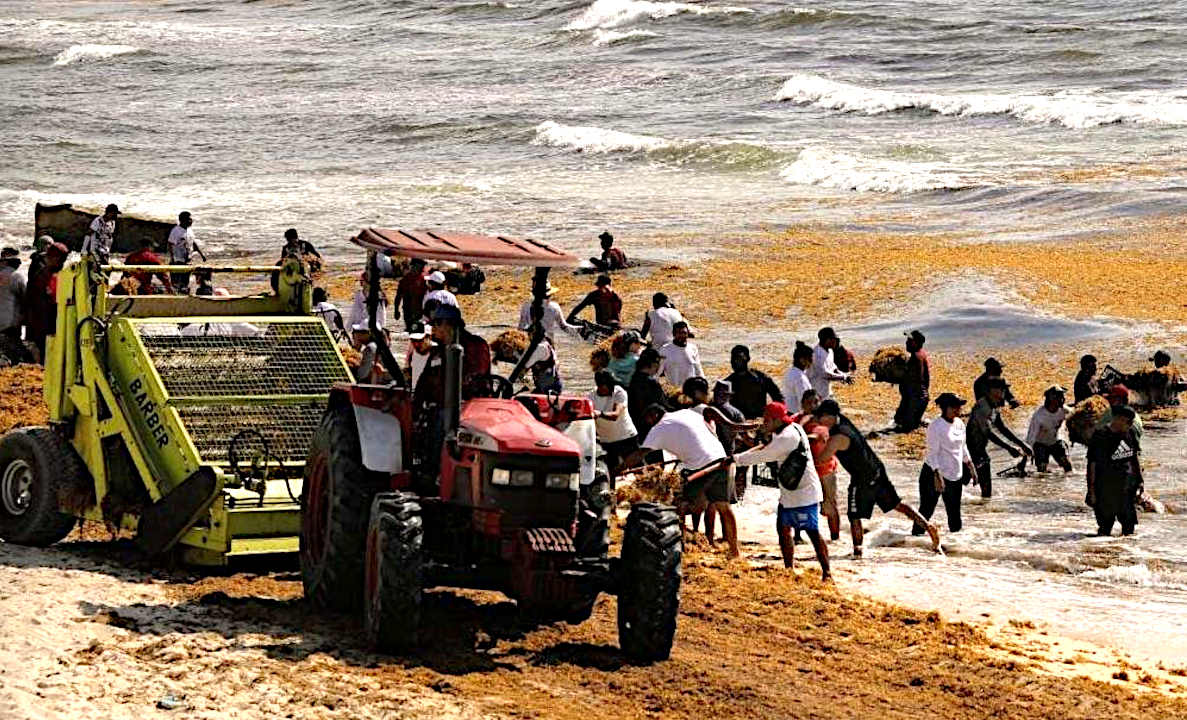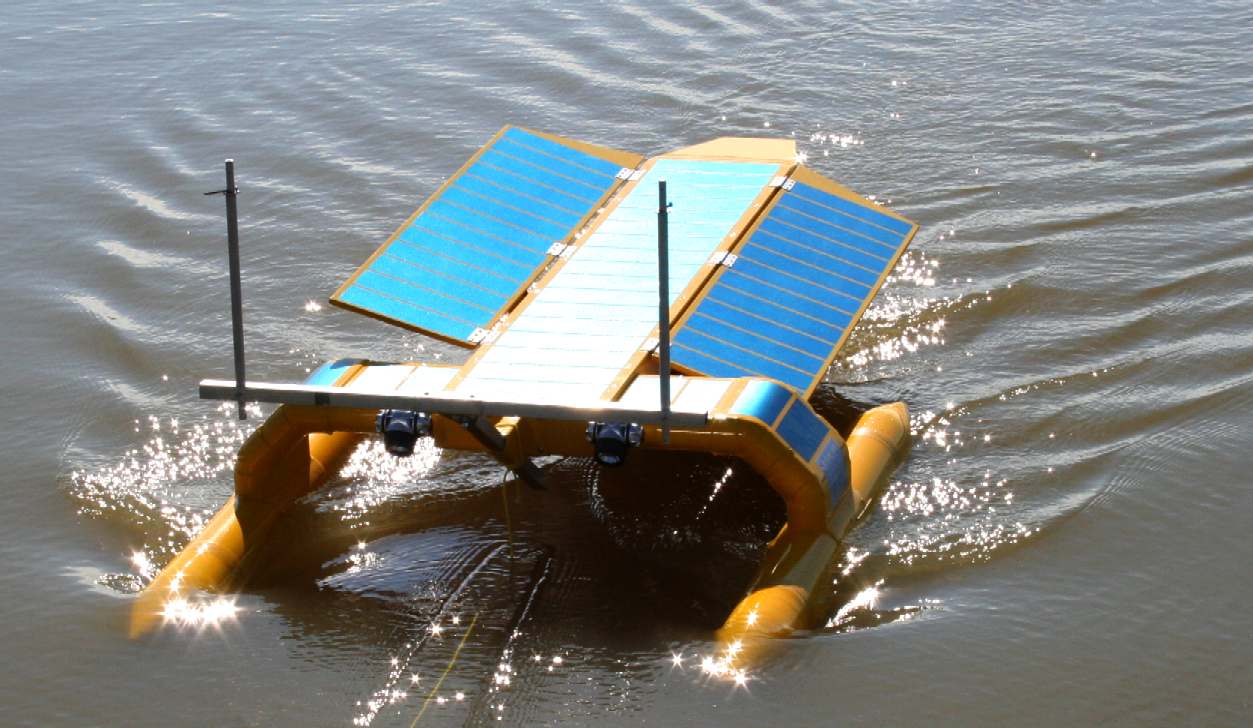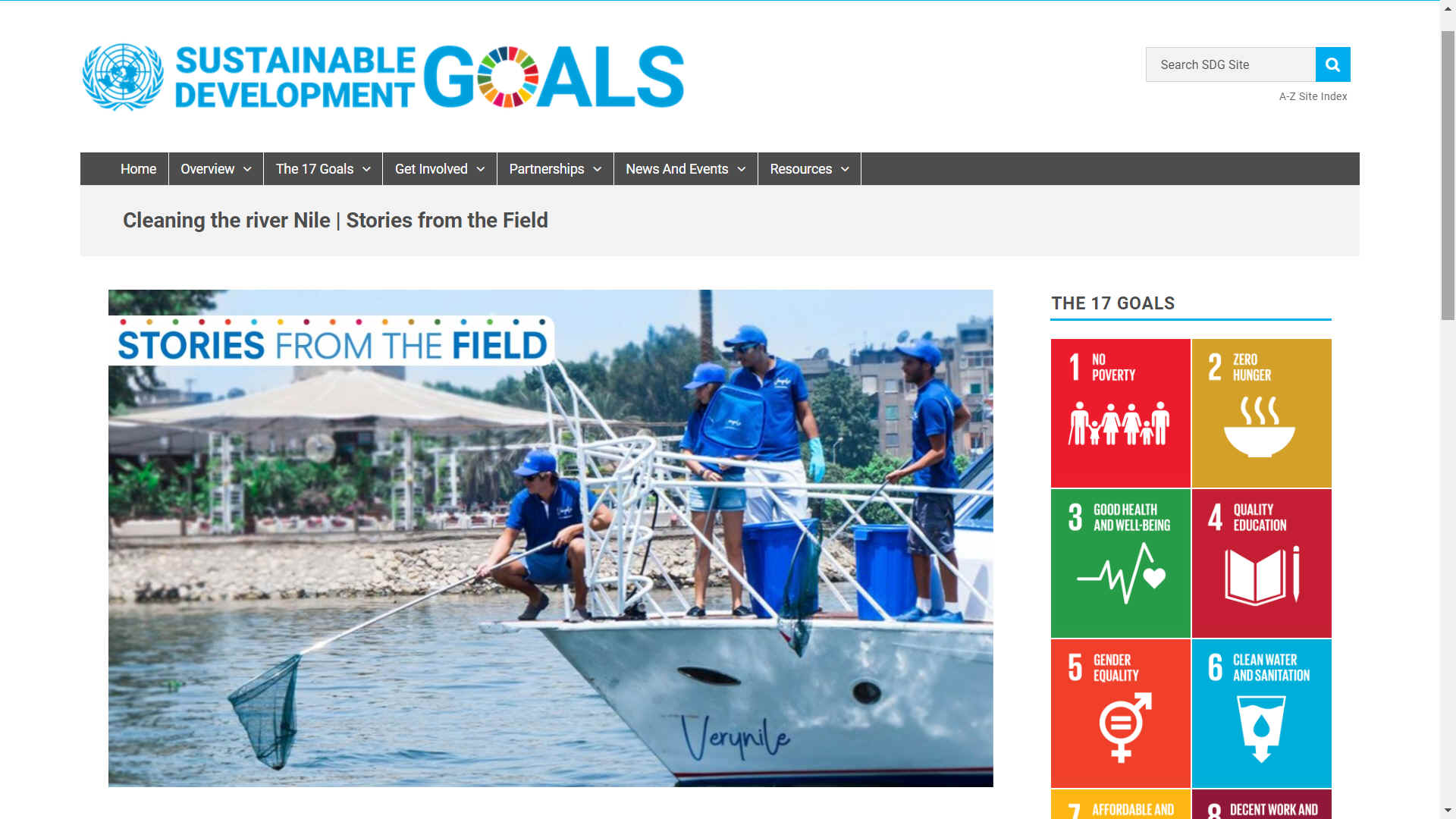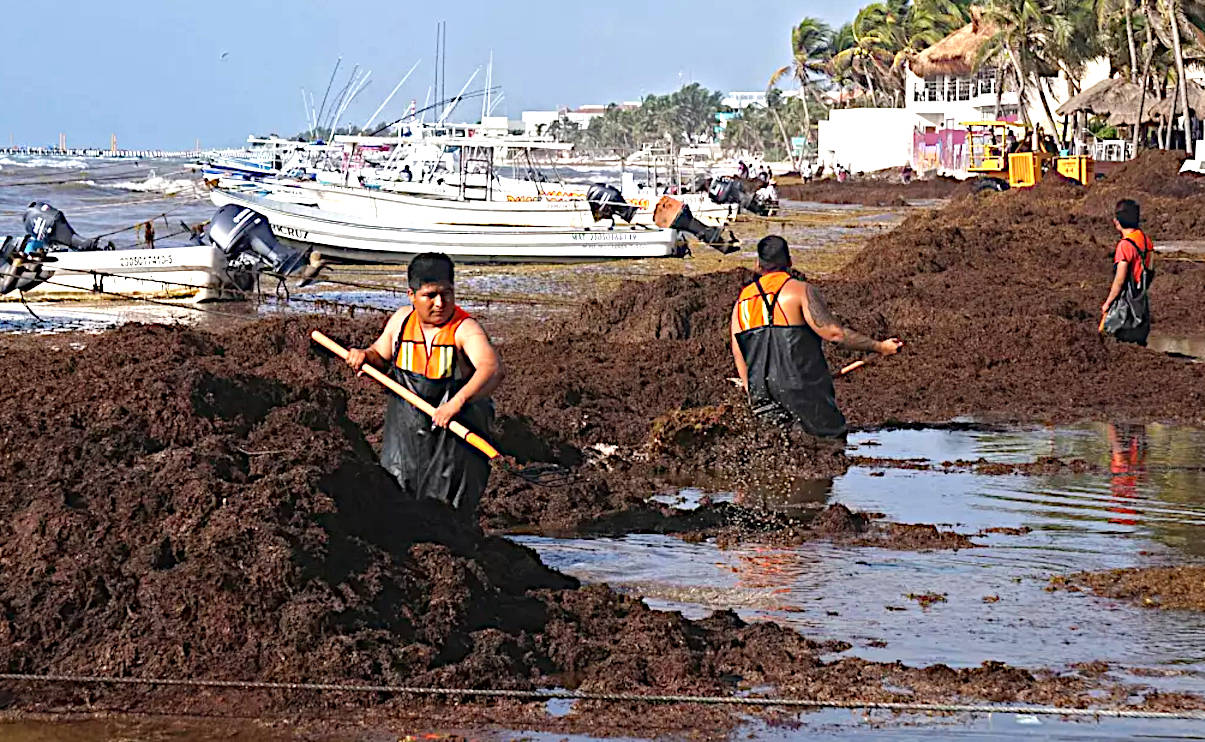|

BEACH
CLEANS - Sargassum is found in the tropical oceans of the world. They are also called planktonic (free-floating species) which inhabits coral reefs and shallow water and are the genus of brown algae of sargassaceae family. These are small in size and have leaf-like toothed edges. Some of its species are reproduced sexually and pelagic species are reproducing by fragmentation. The term Sargassum was initiated by Portuguese sailors who found it in the Sargasso Sea. They are brown genus which may grow to a length of meters.
All
our oceans,
seas and rivers are now extremely polluted. This is partly to
do with our obsession with plastic, and partly to do with our
reliance on fossil
fuels for marine transport, mostly subsidized, in denial
of alternative renewables like solar and green hydrogen, or
green methanol clean energy.

MARINE COMBINED
HARVESTER -
The basic SeaVax machine is seen here as a proof of concept
(working model). It was designed to filter macro & micro
plastics from seawater - in bulk, and recover
ghost
fishing nets of up to 150 tons. It was to be solar and
wind powered when conceived in 2015. Today, the vessel would
need more power if a fleet of them are to deal with something
like 24 million tons of sargassum a year, or the increase in discarded
fishing gear. Around triple the 8
million ton capacity envisaged for marine
litter.
Any revised specification would probably need to include
renewable hydrogen in the energy equation. The Foundation is
open to expressions of interest, looking for partners in the
affected regions, who may be looking to operate a business,
working with a charity that will provide IP, marketing and technical
support.
Since before the days of the
Pharaohs, the
River Nile has brought prosperity to the people living on its banks.
Its water is used to irrigate the Nile valley, creating some of
Africa’s most fertile farmlands. Used as a waterway to ferry goods, the river has facilitated the flow of trade in the region for millennia. It is the essence of life in Egypt.
However, the Nile has been used to carry more than just goods. Over the centuries, bathwater, sewerage, industrial effluent and plenty of plastic objects have ended up in the
river. In some areas, its clear blue waters have turned a murky brown due to pollution and environmental degradation. Because the Nile is so important for the environment and as a facilitator of trade and economic growth, we decided to do something about it.
Teaming up with the VeryNile campaign, they set out to help clean up the world’s longest river. During our Global Volunteer Week, when we encourage employees to support their communities, 30 people from
a team at DP World Sokhna put on their gloves and boots and started collecting up litter that had been thrown into the river. In total,
they removed over 600kg of waste, which included a lot of single use plastic bottles and all kinds of other rubbish.

Egypt’s Green Transformation Strategy embraces many of the principles and objectives of a green economy. The 7th Egyptian Competitiveness Report published by the Egypt Competitiveness Council is titled “Green Egypt: A Vision for Tomorrow” and focused on a framework and strategic elements for a green transformation of the economy and society.
Egypt is a UNEP Green Economy “flagship country”. The “flagship” countries are meant to constitute a critical mass of green economy “champions” with readiness to pro-actively and constructively engage in moving forward a positive agenda on green economy in the run-up to the Rio+20 Conference. UN “acting as One” on Green Economy.
Projects like this, that protect natural habitats and ecosystems are a good way of putting
sustainability strategies like, Our World, Our Future, into practice. As well as cleaning up the riverbank and the immediate area,
they also prevent harmful waste from reaching the sea, thereby helping protect life in the oceans, which is one of
DPs sustainability
develoment goals.
This was our first initiative with the VeryNile campaign, and through continuing
their work with VeryNile, they hope to play a part in improving environmental
awareness in the community and developing sustainable ways of cleaning the river such as recycling and upcycling programmes.
At the Port of Sokhna, DP import and export goods from Egypt, connecting the country with global trade networks and helping promote
economic
growth. Meanwhile, by helping clean up the Nile we’re also helping the country maintain its original trade network and source of prosperity. One day,
DP hope to see clear blue waters flowing the entire length of the Nile, into the ocean.

SOME OTHER ENVIRONMENTAL CAMPAIGNS IN EGYPT ARE:
- Go Green Initiative: This is a national campaign launched by the Presidency of Egypt in 2020, as part of the National Sustainable Development Strategy “Egypt 2030”. It aims to change behaviors, spread environmental awareness and urge citizens - especially young people - to protect the environment, natural resources, natural protectorates, and marine life. It also raises awareness on the importance of afforestation, waste recycling, food and energy rationalization, air pollution reduction and plastic use
abatement 1.
- Live Green Initiative: This is a national campaign launched by the Ministry of Environment in 2022, to raise awareness of the impacts of climate change and the need for adaptation and mitigation measures. It also involves citizens in the processes of preserving the environment and enhancing its
resilience 2.
- Green Egypt Initiative: This is an initiative launched by the Ministry of Environment in 2022, to intensify efforts in preparation for hosting the UN Conference on Climate Change 2022
(COP27). It includes a number of projects and activities to resolve environmental problems and ease the impact of climate change, such as planting 100 million trees, expanding renewable energy sources, improving waste management, and promoting green
economy 3.
SOME OF THE ENVIRONMENTAL PROBLEMS IN EGYPT ARE:
- Water scarcity: Egypt is one of the most water-stressed countries in the world, with only 660 cubic meters of water per capita per year, compared to the global average of 7,000 cubic meters. The main source of water is the Nile River, which is shared by 11 countries and faces increasing demand and pollution. Climate change is expected to reduce the Nile’s flow and increase evaporation, affecting
agriculture, industry, and domestic
use 1 2 3.
- Air pollution: Cairo is ranked as one of the most polluted cities in the world, with high levels of particulate matter, nitrogen dioxide,
sulfur
dioxide, ozone, and carbon monoxide. The main sources of air pollution are traffic, industry, waste burning, and dust storms. Air pollution causes respiratory diseases, cardiovascular diseases, and premature
deaths 1 2.
- Damage to historic monuments: Egypt has a rich cultural heritage, with many ancient monuments and archaeological sites. However, these are threatened by environmental factors such as air pollution,
water encroachment, soil erosion, urbanization, and vandalism.
Air pollution can corrode the stone and metal structures, while water can seep into the foundations and cause cracks and collapses. Some of the monuments at risk are the Pyramids of Giza,
the
Sphinx, the Valley of the
Kings, and the temples of Luxor and
Karnak 1 4.
- Waste management: Egypt generates about 90 million tons of solid waste per year, of which only 60% is collected and 3% is recycled. The rest is dumped in open landfills, canals, streets, or burned. This poses serious health and environmental risks, such as the spread of diseases, contamination of water and soil, emission of greenhouse gases, and attraction of pests and rodents. The main challenges for waste management are the lack of infrastructure, regulations, awareness, and
financing 1 2.

The government of Egypt has adopted several policies and initiatives to address environmental issues in Egypt, such as:
- The National Environmental Action Plan (2002), which aimed to place the environment at the center of
modernization 1.
- The Sustainable Development Strategy: Egypt Vision 2030 (2016), which integrated environmental protection programs in its economic, social, and environmental
dimensions 2.
- The National Climate Change Strategy (2020), which outlined the vision, objectives, and actions for enhancing climate resilience and low-carbon
development 3.
- The Green Egypt Initiative (2022), which included projects and activities to resolve environmental problems and ease the impact of climate change, such as
planting 100 million
trees, expanding renewable energy sources, improving waste management, and promoting green
economy 3.
- The Go Green Initiative (2020) and the Live Green Initiative (2022), which aimed to change behaviors, spread environmental awareness, and urge citizens to protect the environment, natural resources, and marine
life 2 4.
The government also cooperates with various stakeholders, such as civil society, private sector, academia, and international organizations, to implement and monitor environmental policies and initiatives. However, some challenges remain, such as the lack of adequate funding, enforcement, and coordination, as well as the resistance to change and the low public awareness of environmental
issues 1 2 4.
INTERNATIONAL
ORGANIZATIONS
International organizations play an important role in protecting the environment in Egypt by providing technical and financial assistance, policy advice, capacity building, and advocacy. Some of the examples are:
United Nations Environment Programme
UNEP: The United Nations Environment Programme (UNEP) supports Egypt as a Green Economy “flagship country”, which means that Egypt is committed to advancing a positive agenda on green economy in the context of sustainable development and poverty eradication. UNEP also provides advisory services, knowledge products, and platforms for dialogue and cooperation on various environmental issues, such as climate change, biodiversity, waste management, and green finance1.
United Nations Development Programme
UNDP: The United Nations Development Programme (UNDP) helps Egypt to implement the 2030 Agenda for Sustainable Development and the Sustainable Development Goals (SDGs), as well as to address the impact of the COVID-19 pandemic on its development trajectory. UNDP also supports Egypt in areas such as governance, social justice, gender equality, youth empowerment, and environmental
sustainability 2.
UNESCO
UNESCO: The United Nations Educational, Scientific and Cultural Organization
(UNESCO) works with Egypt to safeguard its cultural and natural heritage, especially the
World Heritage
Sites, such as the Pyramids of Giza, the Valley of the Kings, and the temples of Luxor and Karnak. UNESCO also promotes education for sustainable development, science for society, and freedom of expression and access to
information 3.
World Food Programme
WFP: The World Food Programme (WFP) assists Egypt in achieving food security and nutrition, especially for the most vulnerable groups, such as children, women, refugees, and people with disabilities. WFP also supports Egypt in enhancing its resilience to shocks and stresses, such as
climate change, desertification, and economic
crises 4.
There have been several river clean-up campaigns around the world before COP27, as part of the global efforts to combat climate change and protect the environment. Here are some examples:
- The Thames
River: In London, volunteers from Thames 2 1, a charity that works to improve the health of the river, collected over 300 tonnes of rubbish from the Thames in
2022 1. The Thames is home to over 100 species of fish and many other wildlife, and is also a source of drinking
water for millions of
people 2.
- The Ganges
River: In India, the government launched the Namami Gange programme in 2015, with a budget of $3 billion, to clean and rejuvenate the Ganges, which is considered sacred by Hindus and provides water to about 40% of India’s
population 3. The programme involves building sewage treatment plants, installing trash skimmers, creating public awareness, and promoting eco-tourism along the
river 4.
- The Amazon
River: In Brazil, the Amazonas Sustainable Foundation (FAS), a non-governmental organization, coordinated a massive clean-up operation in the Amazon River in 2021, involving more than 2,000 people from 16
communities 5. The Amazon is the largest river in the world by volume and the second longest, and supports a rich biodiversity and indigenous
cultures 6.
These are just some of the examples of the river clean-up campaigns that have taken place before COP27.
LINKS
& REFERENCE
https://www.dpworld.com/our-insights/cleaning-up-the-worlds-longest-river
https://www.presidency.eg/
https://www.egypttoday.com/Article/1/118448/Egypt-launches-national-campaign-to-raise-awareness-of-climate-change
https://www.al-monitor.com/originals/2022/08/egypt-intensifies-green-initiatives-ahead-cop27
https://www.eg.undp.org/content/egypt/en/home/presscenter/pressreleases/2020/egypt-launches-its-first-campaign-to-promote-its-protected-areas.html
https://english.ahram.org.eg/NewsContent/1/2/473445/Egypt/Society/Egypt-launches-campaign-to-promote-ecotourism-ahea.aspx
https://en.wikipedia.org/wiki/Environmental_issues_in_Egypt
https://environmentgo.com/environmental-issues-in-egypt/
https://www.imf.org/en/News/Articles/2022/06/15/CF-Egypt-Nile-Delta-sea-level-rise
https://infogalactic.com/info/Environmental_issues_in_Egypt
https://www.hrw.org/news/2022/09/12/egypt-government-undermining-environmental-groups
https://sustainabledevelopment.un.org/content/documents/279512021_VNR_Report_Egypt.pdf
https://www.imf.org/en/News/Articles/2022/06/15/CF-Egypt-Nile-Delta-sea-level-rise
https://greenfiscalpolicy.org/policy_briefs/egypt-country-profile/
https://www.egypttoday.com/Article/1/8836/Egypt%E2%80%99s-approach-to-protecting-the-environment
https://www.presidency.eg/
https://www.egypttoday.com/Article/1/118448/Egypt-launches-national-campaign-to-raise-awareness-of-climate-change
https://www.al-monitor.com/originals/2022/08/egypt-intensifies-green-initiatives-ahead-cop27
https://www.eg.undp.org/content/egypt/en/home/presscenter/pressreleases/2020/egypt-launches-its-first-campaign-to-promote-its-protected-areas.html
https://english.ahram.org.eg/NewsContent/1/2/473445/Egypt/Society/Egypt-launches-campaign-to-promote-ecotourism-ahea.aspx
https://en.wikipedia.org/wiki/Environmental_issues_in_Egypt
https://environmentgo.com/environmental-issues-in-egypt/
https://www.imf.org/en/News/Articles/2022/06/15/CF-Egypt-Nile-Delta-sea-level-rise
https://infogalactic.com/info/Environmental_issues_in_Egypt
https://www.hrw.org/news/2022/09/12/egypt-government-undermining-environmental-groups
https://sustainabledevelopment.un.org/content/documents/279512021_VNR_Report_Egypt.pdf
https://www.imf.org/en/News/Articles/2022/06/15/CF-Egypt-Nile-Delta-sea-level-rise
https://greenfiscalpolicy.org/policy_briefs/egypt-country-profile/
https://www.egypttoday.com/Article/1/8836/Egypt%E2%80%99s-approach-to-protecting-the-environment
https://www.theguardian.com/world/2024/jan/13/red-sea-crisis-could-shatter-hopes-of-economic-recovery
https://www.dpworld.com/our-insights/cleaning-up-the-worlds-longest-river
|



